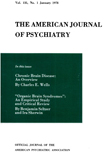Relationship of Clinical Symptomatology to Abnormal EEG Findings: A Family Study
Abstract
This paper presents the study of a seven-member family, six of whom showed significant EEG abnormalities. An attempt was made to correlate these data with other clinical information gathered, using the standard MMPI and standard psychological tests which were rated under "blind" techniques. The method of psychological testing and rating used in this study would appear to be quite useful in studying a family or small group as it revealed the most significant data, differentiating clearly those members with EEG abnormalities from the member with a normal EEG. None of the methods employed was able to accurately differentiate the four members with 14 and 6/second positive spiking from the two members with other types of EEG abnormalities.
Access content
To read the fulltext, please use one of the options below to sign in or purchase access.- Personal login
- Institutional Login
- Sign in via OpenAthens
- Register for access
-
Please login/register if you wish to pair your device and check access availability.
Not a subscriber?
PsychiatryOnline subscription options offer access to the DSM-5 library, books, journals, CME, and patient resources. This all-in-one virtual library provides psychiatrists and mental health professionals with key resources for diagnosis, treatment, research, and professional development.
Need more help? PsychiatryOnline Customer Service may be reached by emailing [email protected] or by calling 800-368-5777 (in the U.S.) or 703-907-7322 (outside the U.S.).



